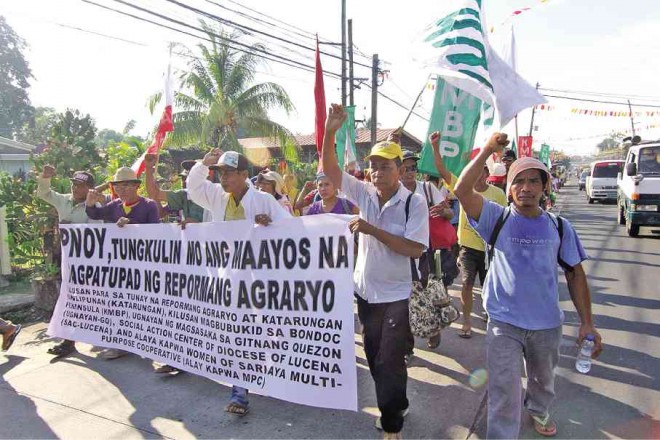
QUEZON farmers march from Lucena City to Manila to demand the completion of the government’s land reform program and the return of the coconut levy fund. DELFIN T. MALLARI JR./INQUIRER SOUTHERN LUZON
LUCENA CITY, Philippines—Some 600 farmers from Quezon province started the five-day march/caravan to Manila yesterday to demand the final resolution of the agrarian conflict in the province and the return of the multibillion-peso coconut levy fund to the farmers.
The farmers would march anew to Manila to demand continuity of the land distribution programs and its genuine implementation, particularly in Bondoc Peninsula, said Jansept Geronimo, spokesperson of Kilusan Para sa Tunay na Repormang Agraryo at Katarungan Panlipunan (Katarungan)-Quezon.
On Tuesday morning the farmers hiked their way along Maharlika Highway toward the nearby town of Sariaya to meet farmers from the central part of the province.
The extended Comprehensive Agrarian Reform Program of the government is scheduled to end this month.
Daniel Montes from Bondoc Peninsula said he left his wife and two children under the care of his neighbors to join the protest march.
In November 2011, the Quezon farmers also staged a Lucena-Manila protest march for the return of the coconut levy fund and distribution of land in Bondoc Peninsula, one of the hotbeds of agrarian conflict in Southern Tagalog.
Geronimo said farmers in Bondoc Peninsula continued to be harassed with court suits, death threats and killer bullets.
Six farmer leaders had been killed in Bondoc Peninsula allegedly due to agrarian conflict, while some 400 criminal cases, mostly for theft of coconuts, had been filed against more than 300 tenants, records of the Kilusang Magbubukid ng Bondoc Peninsula showed.
Geronimo said the marchers, composed mostly of coconut farmers, would also push for the return of the coco levy fund. He said they have set a dialogue with Presidential Commission on Good Government Chair Andres Bautista for an update on the status of the multibillion-peso coco levy fund, and the government’s plan for its disposition.
“As we wait for the dialogue, we will continue the campaign for the immediate return of the fund to the original contributors, most of them now old, sick and dying,” Geronimo said.
Quezon farmers are believed to have been the biggest contributors to the coco levy fund exacted from them from 1973 to 1982 during the martial law regime under dictator Ferdinand Marcos. The levy, claimed its proponents, was meant to develop the country’s coconut industry.
The recovered fund, estimated to be around P70 billion, is expected to benefit more than 20 million coconut farmers and their families from more than 21,000 coconut-producing villages across the country.
Geronimo said they would also stage a protest at the Department of Agrarian Reform office in Manila over the issue of agrarian reform beneficiaries in Sariaya town who continue to be dispossessed of land already granted to them by the government.